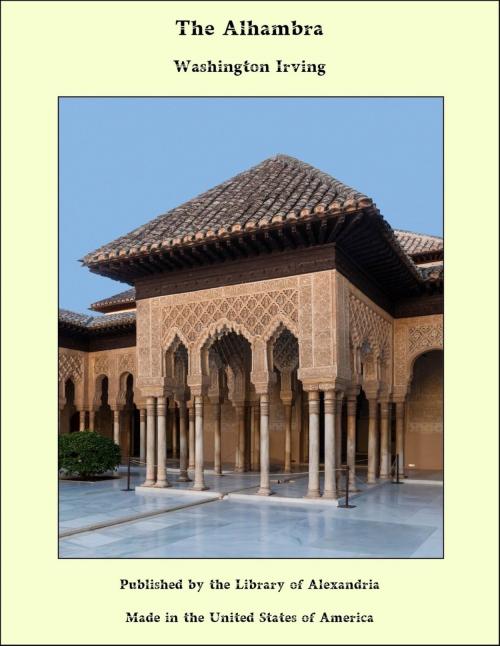| Author: | Washington Irving | ISBN: | 9781465514981 |
| Publisher: | Library of Alexandria | Publication: | March 8, 2015 |
| Imprint: | Language: | English |
| Author: | Washington Irving |
| ISBN: | 9781465514981 |
| Publisher: | Library of Alexandria |
| Publication: | March 8, 2015 |
| Imprint: | |
| Language: | English |
IN the spring of 1829, the author of this work, whom curiosity had brought into Spain, made a rambling expedition from Seville to Granada in company with a friend, a member of the Russian Embassy at Madrid. Accident had thrown us together from distant regions of the globe and a similarity of taste led us to wander together among the romantic mountains of Andalusia. Should these pages meet his eye, wherever thrown by the duties of his station, whether mingling in the pageantry of courts, or meditating on the truer glories of nature, may they recall the scenes of our adventurous companionship, and with them the recollection of one, in whom neither time nor distance will obliterate the remembrance of his gentleness and worth. And here, before setting forth, let me indulge in a few previous remarks on Spanish scenery and Spanish travelling. Many are apt to picture Spain to their imaginations as a soft southern region, decked out with the luxuriant charms of voluptuous Italy. On the contrary, though there are exceptions in some of the maritime provinces, yet, for the greater part, it is a stern, melancholy country, with rugged mountains, and long sweeping plains, destitute of trees, and indescribably silent and lonesome, partaking of the savage and solitary character of Africa. What adds to this silence and loneliness, is the absence of singing-birds, a natural consequence of the want of groves and hedges. The vulture and the eagle are seen wheeling about the mountain-cliffs, and soaring over the plains, and groups of shy bustards stalk about the heaths; but the myriads of smaller birds, which animate the whole face of other countries, are met with in but few provinces in Spain, and in those chiefly among the orchards and gardens which surround the habitations of man. In the interior provinces the traveller occasionally traverses great tracts cultivated with grain as far as the eye can reach, waving at times with verdure, at other times naked and sunburnt, but he looks round in vain for the hand that has tilled the soil. At length he perceives some village on a steep hill, or rugged crag, with mouldering battlements and ruined watchtower: a stronghold, in old times, against civil war, or Moorish inroad; for the custom among the peasantry of congregating together for mutual protection is still kept up in most parts of Spain, in consequence of the maraudings of roving freebooters.
IN the spring of 1829, the author of this work, whom curiosity had brought into Spain, made a rambling expedition from Seville to Granada in company with a friend, a member of the Russian Embassy at Madrid. Accident had thrown us together from distant regions of the globe and a similarity of taste led us to wander together among the romantic mountains of Andalusia. Should these pages meet his eye, wherever thrown by the duties of his station, whether mingling in the pageantry of courts, or meditating on the truer glories of nature, may they recall the scenes of our adventurous companionship, and with them the recollection of one, in whom neither time nor distance will obliterate the remembrance of his gentleness and worth. And here, before setting forth, let me indulge in a few previous remarks on Spanish scenery and Spanish travelling. Many are apt to picture Spain to their imaginations as a soft southern region, decked out with the luxuriant charms of voluptuous Italy. On the contrary, though there are exceptions in some of the maritime provinces, yet, for the greater part, it is a stern, melancholy country, with rugged mountains, and long sweeping plains, destitute of trees, and indescribably silent and lonesome, partaking of the savage and solitary character of Africa. What adds to this silence and loneliness, is the absence of singing-birds, a natural consequence of the want of groves and hedges. The vulture and the eagle are seen wheeling about the mountain-cliffs, and soaring over the plains, and groups of shy bustards stalk about the heaths; but the myriads of smaller birds, which animate the whole face of other countries, are met with in but few provinces in Spain, and in those chiefly among the orchards and gardens which surround the habitations of man. In the interior provinces the traveller occasionally traverses great tracts cultivated with grain as far as the eye can reach, waving at times with verdure, at other times naked and sunburnt, but he looks round in vain for the hand that has tilled the soil. At length he perceives some village on a steep hill, or rugged crag, with mouldering battlements and ruined watchtower: a stronghold, in old times, against civil war, or Moorish inroad; for the custom among the peasantry of congregating together for mutual protection is still kept up in most parts of Spain, in consequence of the maraudings of roving freebooters.















